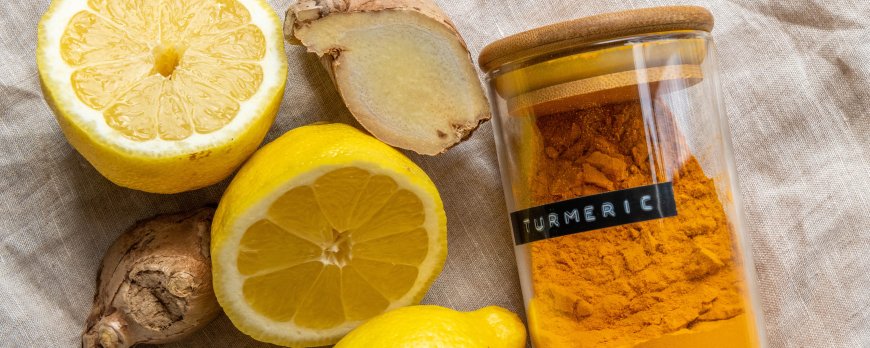Is turmeric good for high cholesterol?
Explore 'Is turmeric good for high cholesterol?' in our comprehensive guide. Uncover the potential benefits and research backing this holistic approach.

Is turmeric good for high cholesterol?
Turmeric is believed to have cholesterol-lowering properties and may offer a natural remedy for high cholesterol. This yellow spice has been used in traditional medicine for centuries and is known for its active ingredient, curcumin. Research has shown that turmeric and curcumin can significantly reduce blood lipid levels, including LDL cholesterol and triglycerides, which are known risk factors for cardiovascular diseases.
While turmeric shows promise in managing high cholesterol, it is important to note that more research is needed to determine the most effective dosage, form, and strength of curcumin. Despite its potential benefits, turmeric should not be used as a substitute for medical treatment or professional advice.
Key Takeaways:
- Turmeric is believed to have cholesterol-lowering properties due to its active compound, curcumin.
- Studies have shown that turmeric and curcumin can significantly reduce LDL cholesterol and triglyceride levels.
- Managing high cholesterol is crucial for protecting against cardiovascular diseases.
- Turmeric is available in various forms, including capsules and powders.
- It is generally safe to consume turmeric, but individuals should consult with a healthcare professional, especially if they are pregnant, breastfeeding, or have certain health conditions.

Understanding high cholesterol and its risks
Before delving into the potential benefits of turmeric, it is essential to understand high cholesterol and its impact on our overall health. Cholesterol is a waxy substance found in our blood that is necessary for the production of hormones, Vitamin D, and substances that aid in digestion. However, high levels of cholesterol, specifically LDL (low-density lipoprotein) cholesterol, can lead to the buildup of plaque in our arteries, increasing the risk of heart disease and stroke.
High cholesterol is often asymptomatic, meaning it doesn't show any visible signs, making it crucial to monitor our cholesterol levels regularly. Factors such as poor diet, lack of exercise, smoking, and genetics can contribute to high cholesterol. It is important to note that managing cholesterol levels is vital for maintaining a healthy heart and preventing cardiovascular diseases.
While medication is commonly prescribed to lower cholesterol levels, many individuals are turning to natural remedies for managing high cholesterol. One such potential remedy is turmeric, a spice commonly used in traditional medicine. Studies have shown that turmeric and its active compound, curcumin, possess cholesterol-lowering properties. Incorporating turmeric into our diet or taking it in supplement form may help reduce LDL cholesterol and triglyceride levels, ultimately reducing the risk of heart-related conditions.
The Science Behind Turmeric's Cholesterol-Lowering Properties
Various scientific studies have shed light on the cholesterol-lowering properties of turmeric and its potential contribution to heart health. Turmeric contains a key compound called curcumin, which has been found to have anti-inflammatory and antioxidant effects. These properties may help reduce the levels of LDL cholesterol, often referred to as "bad" cholesterol, as well as triglycerides.
Research has shown that curcumin can inhibit the production of cholesterol in the liver and improve its clearance from the bloodstream. Additionally, curcumin may also enhance the function of the liver, which plays a crucial role in cholesterol metabolism. These mechanisms contribute to the potential cholesterol-lowering effects of turmeric.
In a study published in the Journal of Medicinal Food, participants who consumed turmeric extract for seven weeks experienced a significant reduction in LDL cholesterol levels compared to those who took a placebo. Another study found that curcumin supplementation led to a decrease in triglyceride levels, which are another type of fat in the blood that can contribute to cardiovascular diseases.
While these findings are promising, more research is needed to determine the optimal dosage and form of curcumin for cholesterol management. Additionally, further studies are required to explore the long-term effects and potential interactions of turmeric with other medications. However, incorporating turmeric into a heart-healthy diet and lifestyle may offer potential benefits for managing cholesterol levels and supporting overall cardiovascular health.

Different forms of turmeric for cholesterol control
Turmeric can be consumed in various forms, providing flexibility in how individuals choose to incorporate it into their daily routine for cholesterol control. Whether you prefer the convenience of capsules, the versatility of powders, or the freshness of the root itself, there are options to suit every preference.
Capsules:
Turmeric capsules are a popular choice for those seeking an easy and convenient way to incorporate turmeric into their cholesterol management routine. These capsules contain standardized amounts of curcumin, ensuring a consistent dosage with each intake. To ensure maximum effectiveness, choose a reputable brand that uses high-quality ingredients and follows good manufacturing practices.
Powder:
Turmeric powder offers a versatile option for those who enjoy cooking and want to infuse their dishes with the health benefits of turmeric. It can be added to curries, stews, soups, smoothies, and even tea. Remember to pair turmeric powder with black pepper, as it enhances the absorption of curcumin in the body. Start with small amounts and gradually increase the quantity to suit your taste preferences.
Fresh roots:
If you prefer a more natural approach, using fresh turmeric roots is an excellent choice. You can grate or finely chop the roots and add them to your favorite dishes, such as stir-fries or salads, or steep them in hot water to make a delicious and aromatic turmeric tea. Fresh turmeric roots can be found in specialty grocery stores or health food stores.
When choosing the form of turmeric that best suits your needs, consider factors such as convenience, taste, and personal preference. Remember that turmeric is a complementary approach to managing cholesterol levels and should be used in conjunction with a balanced diet, regular exercise, and other healthy lifestyle choices. As with any supplement or dietary change, it's important to consult with a healthcare professional before incorporating turmeric into your routine, especially if you have any underlying health conditions or are taking medications.

Dosage and Usage Recommendations
When using turmeric as a natural remedy for high cholesterol, it is crucial to follow recommended dosage guidelines and seek guidance from a healthcare professional. While turmeric is generally safe for consumption, it is important to understand the appropriate dosage for your specific needs.
For general health benefits, it is recommended to consume 500 to 2,000 milligrams of turmeric per day. This can be obtained through adding turmeric powder to your food or incorporating it into beverages like tea or smoothies. However, it is important to note that the curcumin content in turmeric is relatively low, so higher doses may be required to achieve desired cholesterol-lowering effects.
For individuals looking for more concentrated and standardized doses of curcumin, turmeric supplements are available in the form of capsules or tablets. These supplements often contain higher levels of curcumin and can provide the necessary dosage for cholesterol control. It is advisable to choose high-quality supplements from reputable brands and follow the instructions provided on the packaging.
Summary:
- Follow recommended dosage guidelines and consult with a healthcare professional
- For general health benefits, consume 500 to 2,000 milligrams of turmeric per day
- Consider turmeric supplements for higher doses of curcumin
- Choose high-quality supplements from reputable brands
Remember, while turmeric shows promise in reducing cholesterol levels, individual responses may vary. It is essential to work with a healthcare professional who can assess your specific health needs and advise on the appropriate dosage and usage of turmeric as a natural remedy for high cholesterol. By doing so, you can optimize its potential benefits while ensuring your safety and well-being.
Potential Side Effects and Precautions
While turmeric is generally safe to consume, it is important to be aware of potential side effects and take necessary precautions, especially for certain individuals.
1. Side Effects:
- Nausea: Some people may experience mild stomach discomfort or nausea after consuming turmeric. This can be alleviated by taking it with food.
- Diarrhea: Turmeric may cause loose stools or diarrhea in some individuals. It is recommended to start with a small dosage to assess tolerance.
- Skin Allergies: Turmeric can cause skin rashes or allergic reactions in sensitive individuals. It is advisable to perform a patch test before using turmeric topically or consuming it in large amounts.
2. Precautions:
- Pregnant and Breastfeeding Women: It is essential for pregnant and breastfeeding women to consult with a healthcare professional before using turmeric as a supplement or in larger amounts in their diet.
- Health Conditions: Individuals with gallbladder problems, bleeding disorders, or scheduled surgeries should exercise caution when consuming turmeric. It is crucial to seek medical advice to ensure turmeric does not interfere with medications or worsen existing health conditions.
It is always recommended to consult with a healthcare professional before incorporating turmeric into your routine, especially if you have any existing health concerns or are taking medications. They can provide personalized guidance and advice based on your specific circumstances.

The Importance of Further Research
While preliminary research is promising, further studies are needed to solidify the role of turmeric in managing and reducing cholesterol levels effectively. The current body of research suggests that turmeric and its active compound, curcumin, have the potential to significantly reduce LDL cholesterol and triglyceride levels, thereby lowering the risk of cardiovascular diseases. However, more comprehensive studies are necessary to determine the most effective dosage, form, and strength of curcumin for cholesterol control.
One area that requires further exploration is the long-term effects of turmeric consumption on cholesterol levels. Most existing studies have focused on short-term interventions, and it remains unclear whether the cholesterol-lowering benefits of turmeric can be sustained over an extended period. Additional research is also needed to investigate the potential interactions of turmeric with other medications commonly used by individuals with high cholesterol or heart-related conditions.
The potential benefits of turmeric for managing cholesterol levels must be investigated in diverse populations, including those with specific health conditions or risk factors. This can help determine if turmeric is equally effective for different groups of people and ensure its safety in various contexts.
Furthermore, the optimal form of turmeric for cholesterol control needs to be determined. While turmeric is available in different forms, such as capsules, powders, or fresh roots, it is unclear which form provides the most significant benefits. Additionally, some individuals may find it challenging to incorporate turmeric into their daily routine or may prefer alternative methods of consumption. Further research can help identify alternative delivery methods or formulations, such as turmeric extracts or standardized supplements, that may enhance the bioavailability and effectiveness of curcumin.
In conclusion, while preliminary research indicates that turmeric may be beneficial in managing high cholesterol levels, there is a need for more extensive scientific studies to confirm its efficacy and determine the most effective ways to use it. Only through further research can we establish turmeric's role and potential as a natural remedy for reducing cholesterol levels and promoting heart health.

Incorporating Turmeric into a Heart-Healthy Lifestyle
Incorporating turmeric into a heart-healthy lifestyle can be achieved through simple and enjoyable ways, allowing individuals to reap the potential benefits for cholesterol control. Whether you're a culinary enthusiast or prefer the convenience of supplements, there are various options to consider:
- Turmeric in cooking: One of the easiest ways to incorporate turmeric into your diet is by adding it to your cooking. Turmeric can be used in a variety of dishes, including curries, soups, stir-fries, and even salad dressings. Its vibrant color and earthy flavor can enhance the taste of your meals while providing potential heart health benefits.
- Turmeric in beverages: If you enjoy sipping on warm drinks, consider adding a sprinkle of turmeric to your tea or golden milk. Turmeric-infused beverages not only offer a soothing and comforting experience but also provide a convenient way to consume turmeric regularly.
- Turmeric supplements: For those who prefer a more targeted approach, turmeric supplements can be a convenient option. Available in capsule form, these supplements provide a standardized dose of curcumin, the active compound in turmeric. However, it's essential to consult with a healthcare professional to determine the appropriate dosage for your specific needs.
When incorporating turmeric into your routine, it's important to remember that consistency is key. While turmeric shows promise in supporting heart health and cholesterol control, it is not a quick fix. Regular and long-term consumption may yield the best results. Additionally, it is crucial to maintain an overall heart-healthy lifestyle, which includes a balanced diet, regular exercise, and stress management.
Conclusion
Turmeric shows promise in its potential to lower cholesterol levels and support heart health, but further research is required to fully understand its benefits.
For centuries, turmeric has been used in traditional medicine to treat various ailments, thanks to its active compound, curcumin. Recent studies have shown that turmeric and curcumin can significantly reduce blood lipid levels, including LDL cholesterol and triglycerides. By reducing cholesterol levels, turmeric may help protect against cardiovascular diseases.
Despite these promising findings, more research is needed to determine the most effective dosage, form, and strength of curcumin for cholesterol management. Additionally, the optimal way to incorporate turmeric into a heart-healthy lifestyle is still being explored.
Turmeric is available in various forms, including capsules, powders, and fresh roots. It can be easily incorporated into daily life by adding it to cooking, smoothies, or tea. However, it is important to note that some individuals may experience side effects such as nausea, diarrhea, and skin allergies. Pregnant and breastfeeding women, as well as those with certain health conditions, should consult with a healthcare professional before incorporating turmeric into their routine.
In summary, while turmeric shows promise in reducing cholesterol levels and supporting heart health, it is essential to await further research to validate its benefits fully. In the meantime, individuals interested in incorporating turmeric into their cholesterol management routine should consult with healthcare professionals for personalized recommendations.
FAQ
Is turmeric effective in lowering cholesterol?
Turmeric is believed to have the potential to lower cholesterol levels. Studies have shown that turmeric and its active compound, curcumin, can significantly reduce blood lipid levels, including LDL cholesterol and triglycerides. However, more research is needed to determine the most effective dosage, form, and strength of curcumin.
How can I consume turmeric for cholesterol control?
Turmeric is available in various forms and can be consumed by adding it to food or taking it in capsule form. You can incorporate turmeric into your diet by using it as a spice in cooking, adding it to smoothies or tea, or taking turmeric supplements. It's important to consult with a healthcare professional to determine the appropriate dosage and form for your individual needs.
Are there any side effects or precautions associated with turmeric consumption?
While turmeric is generally safe to consume, some individuals may experience side effects such as nausea, diarrhea, and skin allergies. Pregnant and breastfeeding women, as well as individuals with certain health conditions, should consult with a healthcare professional before taking turmeric. It's important to discuss any potential interactions or allergies you may have before incorporating turmeric into your routine.
Can turmeric be used as a standalone treatment for high cholesterol?
Turmeric should not be used as a standalone treatment for high cholesterol. It can be used as part of a comprehensive approach to cholesterol management, which includes a healthy diet, regular exercise, and other lifestyle modifications. It's important to work with a healthcare professional to develop a personalized plan for managing cholesterol levels.
Is there a recommended dosage for turmeric for cholesterol control?
The recommended dosage for turmeric for cholesterol control can vary depending on individual needs. It's best to consult with a healthcare professional to determine the appropriate dosage for you. They can take into consideration factors such as your overall health, any existing medical conditions, and any other medications you may be taking.
Can turmeric lower the risk of heart-related conditions?
Turmeric is believed to have the potential to lower the risk of heart-related conditions by reducing cholesterol levels. High cholesterol is a risk factor for cardiovascular diseases, and studies have shown that turmeric and curcumin can significantly reduce blood lipid levels, including LDL cholesterol and triglycerides. However, more research is needed to fully understand the impact of turmeric on heart health.
Can turmeric be used as a natural remedy for high cholesterol?
Turmeric is often used as a natural remedy for high cholesterol due to its potential cholesterol-lowering properties. It can be incorporated into a heart-healthy lifestyle as part of a comprehensive approach to managing cholesterol levels. However, it's important to remember that turmeric should not replace any prescribed medications or medical advice provided by a healthcare professional.
Is turmeric safe for everyone to consume?
While turmeric is generally safe for consumption, pregnant and breastfeeding women should consult with a healthcare professional before taking turmeric. Additionally, individuals with certain health conditions such as gallbladder problems, bleeding disorders, or diabetes should also consult with a healthcare professional before incorporating turmeric into their routine. It's important to discuss any potential risks or interactions with a healthcare professional.
Can turmeric supplements be used as a substitute for turmeric in food?
Turmeric supplements can be used as a convenient alternative to consuming turmeric in food. They provide a concentrated dose of curcumin, the active compound in turmeric. However, it's important to note that supplements should not be used as a substitute for a healthy diet and lifestyle. It's best to incorporate a variety of turmeric sources, including both food and supplements if desired, to ensure a well-rounded approach to cholesterol control.


































































































































